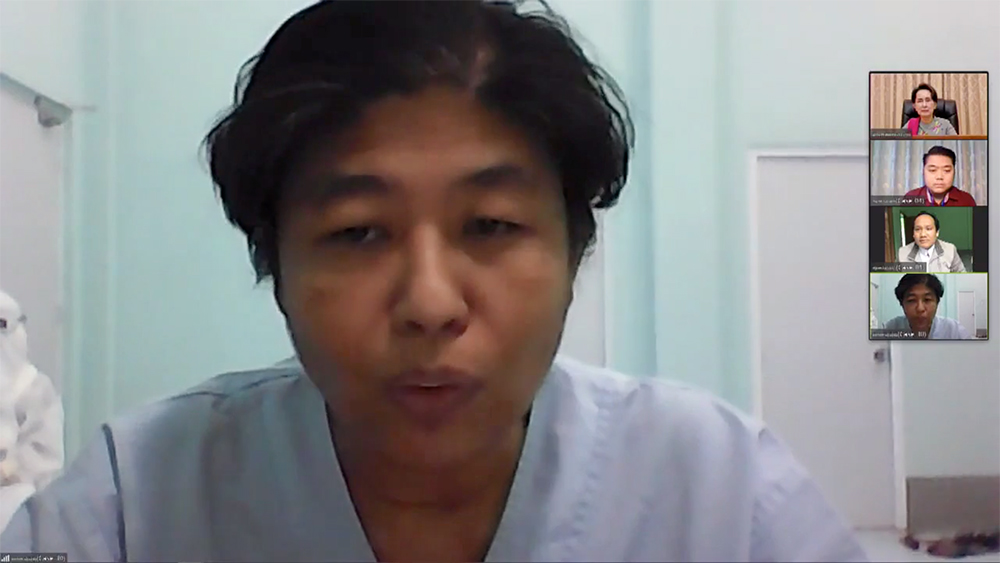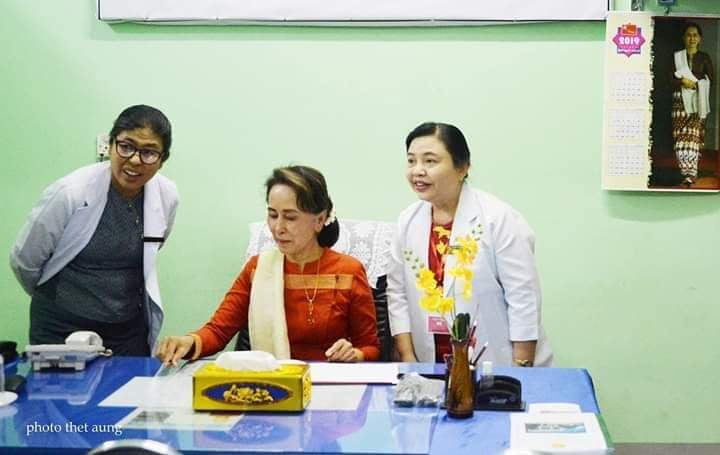YANGON—Knowing she would likely be infected with the deadly virus, 58-year-old anesthesiologist Dr. Myint Myint Sein removed her eye shield without hesitation in order to intubate a COVID-19 patient who was in critical condition and in need of breathing support. The patient later died, and Dr. Myint Myint Sein became the first doctor to be infected with the coronavirus in Myanmar.
“There was no video laryngoscope and the protective gear was adding to the poor visibility. So, I removed the eye shield to intubate [insert a tube into] the patient,” the anesthesiologist explained to State Counselor Daw Aung San Suu Kyi in a videoconference on Tuesday.
Since April 1, the State Counselor has held regular videoconferences with people involved in the fight against COVID-19 in Myanmar’s states and regions. On Tuesday, she held talks with Dr. Myint Myint Sein, who joined the conference from her room at Yangon’s Waibargi Hospital, where she is being treated for COVID-19, and two other recovering patients, one from Chin State and another from Mandalay Region.
During the videoconference, the doctor shared an account of her small team’s struggle to manage COVID-19 patients at Pyay General Hospital in Bago Region and her suggestions for the country’s fight against the pandemic. Both her recollections and her suggestions shed light on the difficulties Myanmar’s health-care workers are currently facing in their attempts to save COVID-19 patients’ lives.
Dr. Myint Myint Sein said she worried that her colleagues on the frontlines of the COVID-19 fight in other states and regions would also fall sick due to the lack of essential medical supplies.

“We need video laryngoscopes to handle COVID-19 patients. Without that, it’s like going into battle without a weapon,” the doctor told the State Counselor.
Despite being one of biggest hospitals in Bago Region, Pyay 500-Bed General Hospital has just two anesthesiologists—Dr. Myint Myint Sein and her assistant. The hospital also lacks properly trained staff to run its intensive care unit, so her small team comprising a few nurses and her assistant struggled to handle the COVID-19 patients.
During the meeting, the visibly ailing anesthesiologist also stressed the importance of training healthcare workers in the proper use of N95 masks and other personal protective equipment, saying they could be dangerous if not used properly. Her explanations were punctuated by occasional coughs.
Daw Aung San Suu Kyi acknowledged the insufficient medical supplies and staff at hospitals across the country. She said the government would try to train and recruit more medical professionals and upgrade hospitals in the long term. For now, she added, they were doing the best that the country’s limited resources would allow.
Dr. Myint Myint Sein said that despite the lack of medical supplies and staff, she was moved to carry on the struggle by her admiration for Daw Aung San Suu Kyi and her inspiring words, telling herself she had to do her best while the country’s de facto leader was taking such a heavy load on her shoulders.
But the anesthesiologist, who is known and highly respected among her colleagues for her outspokenness and professionalism, didn’t hesitate to criticize the centralized government system.

She said she had been pushing the relevant health authorities to prepare the ICU for critical COVID-19 patients at Pyay General Hospital since February. However, the doctor said, the poorly equipped unit was prepared in a hurry shortly before the first patients arrived in early April. She added that health authorities’ directives for dealing with COVID-19 patients were unrealistic from the perspective of those providing treatment on the ground.
“There are delays in implementation on the ground because of the centralization of administrative functions, and the same goes for medical treatment,” she said, adding that the country’s top-down clinical management system was more about ‘senior-worship’ than respect. The result, she said, was that health-care workers felt unable to voice their opinions and use their own judgment when it came to treating patients.
The anesthesiologist said she was experiencing a number of symptoms of COVID-19, with the exception of difficulty breathing. She said she was still testing positive for the coronavirus after three weeks in hospital, and was unable to stand without assistance. She told Daw Aung San Suu Kyi that despite her illness, she did her best to keep her spirits high by adopting positive thinking, singing and doing yoga exercises.
“What gives me strength is thinking of the patients I have treated… And with that strength, I am sure I will beat this disease,” she said.
You may also like these stories:
Corporate Responsibility Is an Integral Part of Korean Investment in Myanmar
Myanmar Launches Sweeping COVID-19 Economic Relief Plan

















